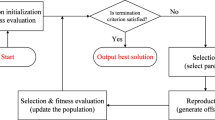Abstract
In this paper, we provide an overview of some recent advances in evolutionary programming. We mainly discuss the principle and technical method of design for classical evolutionary programming and improving evolutionary programming (IEP). IEP has included many types of improving methods to solve realistic problems: fast evolutionary programming, self-adaptive Cauchy evolutionary programming, mixed mutation strategy in evolutionary programming, parallel evolutionary programming, Quality of Transmission (QoT) aware evolutionary programming algorithm, shifting classical evolutionary programming, and surrogate-assisted evolutionary programming. The above methods and some issues related to the future development of evolutionary programming are discussed in this paper.
Access this chapter
Tax calculation will be finalised at checkout
Purchases are for personal use only
Similar content being viewed by others
References
Schwefel, H.P.: Numerical Optimization of Computer Models. Wiley, Chichester (1981)
Holland, J.H.: Adaptation in Natural and Artificial Systems. University of Michigan Press, Ann Arbor (1975)
Fogel, L.J., Owens, A.J., Valsh, M.J.: Artificial Intelligence Through Simulated Evolution. Wiley, New York (1966)
Shelokar, P., Quirin, A.: Three-objective subgraph mining using multiobjective evolutionary programming. J. Comput. Syst. Sci. 80, 16–26 (2013)
Alipouri, Y., Phoshtan, J.: A modification to classical evolutionary programming by shifting strategy parameters. Appl. Intell. 38(2), 175–192 (2013)
Regis, R.G.: Evolutionary programming for high-dimensional constrained expensive black-box optimization using radial basis functions. IEEE Trans. Evol. Comput. 18(3), 326–347 (2014)
Bhanja, U., Mahapatra, S., Roy, R.: An evolutionary programming algorithm for survivable routing and wavelength assignment in transparent optical networks. Inf. Sci. 222, 634–647 (2013)
He, J., Yao, X.: A game-theoretic approach for designing mixed mutation strategies. In: Wang, L., Chen, K., Ong, Y.S. (eds.) ICNC 2005. LNCS, vol. 3612, pp. 279–288. Springer, Heidelberg (2005). doi:10.1007/11539902_33
Saminadan, V., Meenakshi, M.: In-band crosstalk performance of WDM optical networks under different routing and wavelength assignment algorithms. In: Pal, A., Kshemkalyani, A.D., Kumar, R., Gupta, A. (eds.) IWDC 2005. LNCS, vol. 3741, pp. 159–170. Springer, Heidelberg (2005). doi:10.1007/11603771_19
Lee, C.Y., Yao, X.: Evolutionary programming using mutations based on the Lévy probability distribution. IEEE Trans. Evol. Comput. 8(1), 1–13 (2004)
De Jong, K.A.: Genetic algorithms: a 10 year perspective. In: Proceedings the First International Conference on Genetic Algorithms, pp. 169–177. Lawrence Erlbaum Associates, Hillsdale (1985)
Fraser, A.: Simulation of genetic systems by automatic digital computers: I. Introduction. Aust. J. Biol. Sci. 10, 484–491 (1957)
Koza, J.R.: Genetic Programming: On the Programming of Computers by Means of Natural Selection. The MIT Press, Cambridge (1992)
Yao, X., Liu, Y., Lin, G.: Evolutionary programming made faster. IEEE Trans. Evol. Comput. 3(2), 82–102 (1999)
Bäck, T., Schwefel, H.P.: An overview of evolutionary algorithms for parameter optimization. Evol. Comput. 1(1), 1–23 (1993)
Yao, X., Liu, Y.: Fast evolution strategies. Control Cybern. 26(3), 467–496 (1997)
Riessen, G.A., Williams, G.J., Yao, X.: PEPNet: parallel evolutionary programming for constructing artificial neural networks. In: Angeline, P.J., Reynolds, R.G., McDonnell, J.R., Eberhart, R. (eds.) EP 1997. LNCS, vol. 1213, pp. 35–45. Springer, Heidelberg (1997). doi:10.1007/BFb0014799
Tongchim, S., Yao, X.: Parallel evolutionary programming. In: Proceedings of the 2004 Congress on Evolutionary Computation (CEC 2004), Portland, Oregon, USA, June 2004, pp. 1362–1367 (2004)
Hunt, R.A.: Calculus with Analytic Geometry. Harper and Row Publishers, Inc., New York (1986). 322 p., 10225299
Fogel, L.J.: Artificial Intelligence Through Simulated Evolution. Wiley, New York (1966)
Ramamurthy, B., Datta, D., Feng, H., Heritage, J.P., Mukherjee, B.: Impact of transmission impairments on the teletraffic performance of wavelength-routed optical networks. J. Lightwave Technol. 17(10), 1713–1723 (1999)
Fogel, D.B.: Evolving Artificial Intelligence. University of California, San Diego (1992)
Back, T., Schwefel, H.P.: An overview of evolutionary algorithms for parameter optimization. Evol. Comput. 1(1), 1–23 (1993)
Schwefel, H.P.: Evolution and Optimum Seeking. Wiley, New York (1995)
Yao, X., Liu, Y., Lin, G.: Evolutionary programming made faster. IEEE Trans. Evol. Comput. 3(2), 82–102 (1999)
Liu, Y., Yao, X.: How to control search step size in fast evolutionary programming. In: Proceedings of the 2002 IEEE Congress on Evolutionary Computation, pp. 652–656. IEEE Press, USA (2002)
Acknowledgment
This research is supported by the National Natural Science Foundation of China (No. 71331008), the Program for New Century Excellent Talents in University, Foundation for the Author of National Excellent Doctoral Dissertation of PR China (2014-92), the Youth Training Program for Innovation and Entrepreneurship Platform of Science and Technology at Hunan Province, the Outstanding Youth Fund Project of Hunan Provincial Natural Science Foundation (S2015J5050), the Top-notch Innovative Talents Training Plan of National University of Defense Technology, the Outstanding Youth Fund Project of National University of Defense Technology (JQ14-05-01), the Fundamental Research Funds for the Central Universities (531107050772) and Shenzhen Basic Research Project for Development of Science and Technology (JCYJ20160530141956915).
Author information
Authors and Affiliations
Corresponding author
Editor information
Editors and Affiliations
Rights and permissions
Copyright information
© 2016 Springer Nature Singapore Pte Ltd.
About this paper
Cite this paper
Yu, J., Xing, L. (2016). Recent Advances in Evolutionary Programming. In: Gong, M., Pan, L., Song, T., Zhang, G. (eds) Bio-inspired Computing – Theories and Applications. BIC-TA 2016. Communications in Computer and Information Science, vol 682. Springer, Singapore. https://doi.org/10.1007/978-981-10-3614-9_25
Download citation
DOI: https://doi.org/10.1007/978-981-10-3614-9_25
Published:
Publisher Name: Springer, Singapore
Print ISBN: 978-981-10-3613-2
Online ISBN: 978-981-10-3614-9
eBook Packages: Computer ScienceComputer Science (R0)




